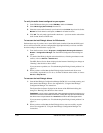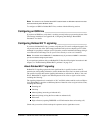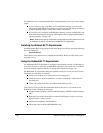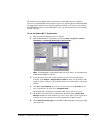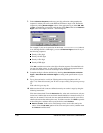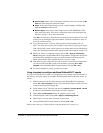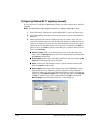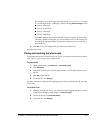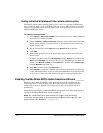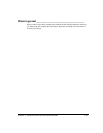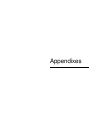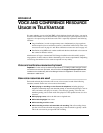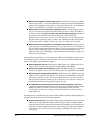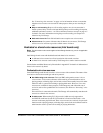
7-42 INSTALLING INTEL TELEPHONY COMPONENTS
Testing individual bit states with the custom actions option
Transmitting custom actions between you and your T1 carrier is a powerful troubleshooting
tool. Use this tool while you are on the phone with your carrier to make sure that it is receiving
what you send, and that you are receiving what it sends. If any problems arise, you can solve
them by redefining the actions.
To transmit custom actions
1. Click
Options > Set Custom Timeslot. Enter the timeslot to use for sending outbound
custom actions, and then click
OK.
2. Uncheck
Options > Respond to Events. Doing this ensures that events sent by your
carrier will be used only for testing and will not be interpreted by the system as an
actual incoming call.
3. On the Advanced tab, select
Custom from the Actions for drop-down list.
4. Click
Add.
5. In the Action dialog box, select the action and bit state you have agreed with your
carrier to test.
Examples: To send a wink, select
Send bit state from the Actions list, and then select
Wink from the Bit State drop-down list. To receive an “A high B high” state from your
carrier, select
Wait for bit state from the Actions list, and then select A high B high
from the Bit State drop-down list.
6. Click
OK to add the action to the Actions for list.
7. Click
Execute to execute the command. If the command is to send an action, the action
is sent. If the command is to receive an action, the Robbed Bit T1 Experimenter stands
by to receive it. The results of the transmission appear in the Logging dialog box.
Installing Toshiba Strata DKTU station boards and drivers _______
Drivers for the Toshiba Strata DKTU station board are automatically installed with the
TeleVantage SR 5.1.1 Driver Updates. Once the Toshiba drivers are installed, no further
configuration is required. When the TeleVantage Server starts, the Toshiba drivers start
automatically.
Information on installing the Toshiba Strata DKTU station board on the TeleVantage Server, is
included in “Installing Intel Dialogic boards” on page 6-6.
Note:
The Toshiba Strata DKTU station board does not appear in the Intel Dialogic
Configuration manager (DCM). The board does appear in Windows Device Manager under
System Devices and is identified as
CTS:PCDKSC card
.



